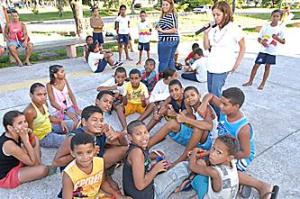Archive
RE: Creating Rights to Land
With more than 45 per cent of arable land owned by a mere 1 per cent of the population, land is a valuable and highly contested resource in Brazil. In Ponte do Maduro, a 50-hectare settlement in Recife, about 10,000 low income families have been struggling for legal rights to the land they have occupied for close to a century. The state provides basic services but without tenure, the residents have few rights and entitlements. Now on the verge of eviction for almost 50 years, the community has partnered with Espaco Feminista, a Brazillian civil society organisation that works with rural, urban and Afro-Brazillian women leaders to reduce gender inequality, particularly in women’s access to resources. A key objective is to increase women’s participation and influence in decision-making, particularly as it relates to land and housing policies.
Espaco Feminsta takes a multi-pronged approach that involves mobilising communities, establishing strategic partnerships with government, NGOs, academicians, and strengthening women’s capacities through training and information. One way they do this is by organising workshops where invited officials share their knowledge of land, race and gender issues, while the women members discuss and sensitise them to the situation on the ground.
In Ponte do Maduro, the women’s needs have been accorded priority at every level. The survey questionnaire, for instance, was designed on the basis of discussions and pilots conducted with grassroots women leaders. Research conducted by Espaco Feminista led to the creation of a large government programme that provides a monthly allowance to poor and vulnerable women. However, pavement dwellers, with no formal address to identify them, were excluded from the programme. Espaco Feminista then coordinated a study interviewing hundreds of pavement dwellers. The findings exposed the living conditions of women excluded from the programme. Over 1,000 landless women were incorporated into the programme after the results were presented to local authorities, government agencies and policy makers.
The involvement of women, trained by Espaco Feminista to negotiate legal and tenure-related issues, has ensured that the regularisation process has been equitable. Land titles in Brazil are traditionally accorded to the male head of the household. The women’s participation in dialogue and negotiation has resulted in the State Housing Department agreeing to put the names of both spouses on the title deed.
With resources tight for both community and organisation, the detail that might pass unnoticed is that this struggle seeks to reverse years of race and gender-based oppression while attempting to benefit the entire community. As Daniela Pedrosa, a resident of Ponte do Maduro says, “We are insisting on the question of gender and participation of women. We are the agents of the process. Today, I feel that I am a leader in my community, well prepared and able to sit at the table and discuss any plan that would benefit my community.”
For more information on Espaco Feminista, please visit: http://www.espacofeminista.org.br/
And on the Huairou Commission, a grassroots women’s network of which Espaco Feminista is a member: http://www.huairou.org/

